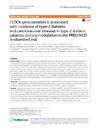Please use this identifier to cite or link to this item:
https://accedacris.ulpgc.es/jspui/handle/10553/73284
| Title: | CLOCK gene variation is associated with incidence of type-2 diabetes and cardiovascular diseases in type-2 diabetic subjects: dietary modulation in the PREDIMED randomized trial | Authors: | Corella, Dolores Asensio, Eva M. Coltell, Oscar Sorlí, José V. Estruch, Ramón Martínez-González, Miguel Angel Salas-Salvadó, Jordi Castañer, Olga Arós, Fernando Lapetra, José Serra-Majem, Lluis Gómez-Gracia, Enrique Ortega-Azorín, Carolina Fiol, Miquel Díez Espino, Javier Díaz-López, Andrés Fitó, Montserrat Ros, Emilio Ordovás, José M. |
UNESCO Clasification: | 32 Ciencias médicas | Keywords: | Blood-Pressure Surge Metabolic Syndrome Transcription Factor Circadian-Rhythms Obesity, et al |
Issue Date: | 2016 | Journal: | Cardiovascular Diabetology | Abstract: | Background: Circadian rhythms regulate key biological processes influencing metabolic pathways. Disregulation is associated with type 2 diabetes (T2D) and cardiovascular diseases (CVD). Circadian rhythms are generated by a transcriptional autoregulatory feedback loop involving core clock genes. CLOCK (circadian locomotor output cycles protein kaput), one of those core genes, is known to regulate glucose metabolism in rodent models. Cross-sectional studies in humans have reported associations between this locus and obesity, plasma glucose, hypertension and T2D prevalence, supporting its role in cardiovascular risk. However, no longitudinal study has investigated the association between CLOCK gene variation and T2D or CVD incidence. Moreover, although in a previous work we detected a gene-diet interaction between the CLOCK-rs4580704 (C > G) single nucleotide polymorphism (SNP) and monounsaturated (MUFA) intake on insulin resistance, no interventional study has analyzed gene-diet interactions on T2D or CVD outcomes.Methods: We analyzed the association between the CLOCK-rs4580704 SNP and incidence of T2D and CVD longitudinally in 7098 PREDIMED trial (ISRCTN35739639) participants after a median 4.8-year follow-up. We also examined modulation by Mediterranean diet (MedDiet) intervention (high in MUFA) on these associations.Results: We observed a significant association between the CLOCK-rs4580704 SNP and T2D incidence in n = 3671 non-T2D PREDIMED participants, with variant allele (G) carriers showing decreased incidence (dominant model) compared with CC homozygotes (HR: 0.69; 95 % CI 0.54-0.87; P = 0.002). This protection was more significant in the MedDiet intervention group (HR: 0.58; 95 % CI 0.43-0.78; P < 0.001) than in the control group (HR: 0.95; 95 % CI 0.63-1.44; P = 0.818). Moreover, we detected a statistically significant interaction (P = 0.018) between CLOCK-rs4580704 SNP and T2D status on stroke. Thus, only in T2D subjects was CLOCK-rs4580704 SNP associated with stroke risk, G-carriers having decreased risk (HR: 0.61; 95 % CI 0.40-0.94; P = 0.024 versus CC) in the multivariable-adjusted model.Conclusions: In agreement with our previous results showing a protective effect of the G-allele against hyperglycemia, we extended our findings by reporting a novel association with lower T2D incidence and also suggesting a dietary modulation. Moreover, we report for the first time an association between a CLOCK polymorphism and stroke in T2D subjects, suggesting that core clock genes may significantly contribute to increased CVD risk in T2D. | URI: | https://accedacris.ulpgc.es/handle/10553/73284 | ISSN: | 1475-2840 | DOI: | 10.1186/s12933-015-0327-8 | Source: | Cardiovascular Diabetology [EISSN 1475-2840], v. 15 (1), article number 4, (Enero 2016) |
| Appears in Collections: | Artículos |
Items in accedaCRIS are protected by copyright, with all rights reserved, unless otherwise indicated.
